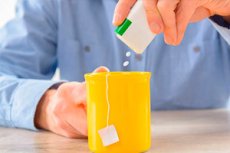New publications
Artificial sugar substitutes 'kill' the liver
Last reviewed: 29.06.2025

All iLive content is medically reviewed or fact checked to ensure as much factual accuracy as possible.
We have strict sourcing guidelines and only link to reputable media sites, academic research institutions and, whenever possible, medically peer reviewed studies. Note that the numbers in parentheses ([1], [2], etc.) are clickable links to these studies.
If you feel that any of our content is inaccurate, out-of-date, or otherwise questionable, please select it and press Ctrl + Enter.

Well-known sugar substitutes, which are perceived by many people as healthy additives, actually have toxic effects on the liver. This was announced by representatives of the American Association for Biochemistry and Molecular Biology during the Experimental Biology 2022 medical conference being held in Philadelphia this spring.
As explained by scientists, sweeteners alter protein function, which negatively affects the cleansing ability of the liver, increasing the risk of toxic hepatitis. This change entails detoxification disorders and accumulation of various toxic substances and metabolic products in the body.
According to statistics, artificial sugar substitutes are consumed by a fairly large percentage of people around the world - for example, in the United States alone, this figure reaches 40% of the population. The use of sweeteners instead of natural sugar is considered by many to be part of a healthy diet: thanks to these additives, people who want to keep their body weight normal do not refuse to eat sweets and at the same time get fewer calories than from conventional sweets. Sweeteners are present in dietary dairy products, juices, carbonated drinks, as well as in baby food, drug suspensions and mixtures. Nevertheless, the use of such components, even in relatively small amounts, already negatively affects the cleansing processes in the liver.
Representatives of the Medical School of Wisconsin studied such artificial substances as sucralose and acesulfame potassium. As a result, it was found that when they enter the liver from the circulatory system, these components inhibit the function of the membrane protein that transports glycoprotein-P. This protein is an important link in the well-coordinated mechanism of cleansing the body of toxic and metabolic products.
In addition, the study proved that sweeteners inhibit the transportation and excretion of other substances - in particular, bile acids, short-chain fats and xenobiotics - components foreign to the body.
As a result of these changes, detoxification of the liver is impaired, and toxic disorders develop. Particularly affected are people who take such medications as antibiotics, antidepressants, and drugs that reduce blood pressure against the background of the use of sugar substitutes.
The researchers proved that the ability of sweeteners to influence the state of glycoprotein-P in hepatocytes is practically independent of the amount and frequency of consumption of such additives. Scientific representatives will receive more detailed information after a series of additional preclinical and clinical studies.
Details of the study can be found at source page
